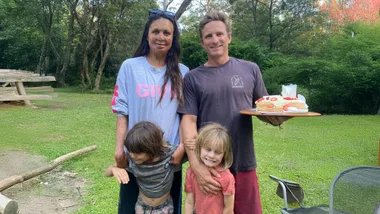Grace Wang is the victim of one of Australia’s most shocking medical mistakes. During birth, her epidural was filled with antiseptic instead of anaesthetic. Today she is severely handicapped and unable to lift her baby. Here, The Weekly‘s Michael Sheather discusses his emotional interview with Grace.
One of the great privileges of working for The Weekly is that I sometimes meet and interview people who truly inspire me.
Grace Wang, the woman injected with antiseptic instead of instead of anaesthetic during an epidural at Sydney’s St George Hospital in June last year, is one of those people.
Small framed and quietly spoken, Grace is a woman of immense character and an immeasurable inner strength. She bears her physical disabilities with a courage and quiet determination that few of us could muster in such difficult circumstances.
The chemical injected into Grace, chlorhexidine, wreaked havoc with her body. As a result of this catastrophic medical blunder, Grace, 32, can no longer control her legs, which are gripped by sudden and painful cramps at all times of the day and night.
She has only limited use of her arms and her grip is now so weak that she has difficulty holding hands with her husband Jason, 42. She needs a mechanical sling to get in and out of bed. Most distressingly, Grace cannot hold her baby son, Alexander.
We conducted our interview in the small unit that she now occupies not far from the main buildings of St George Hospital in Kogarah, south of Sydney. It boasted a small combined kitchen, dining, and lounge room, a bed room and a bathroom. Her son sleeps two rooms away in the care of a nanny.
Grace and Jason came to Australia from China in the hope of building a new life for themselves and starting a family. However, those dreams are now in ruins and their future at best uncertain.
Most difficult for Grace was not her many physical disabilities but rather the loss of normal physical contact with those she loves.
“During the first few weeks after the accident, I could hold and feed my baby,” says Grace. “But later I lost the strength in my arms and hands. Yet no one supported us.
“They left us to cope on our own. One night Alex was crying and he was hungry and I pressed the button but no one came for half an hour. I cried and cried because it was so difficult to know that your baby needed you but you couldn’t do anything.”
For all that, Grace shows little, if any, self-pity. She is, instead, mostly stoic and ready to get on with her life as it now stands. Nevertheless, as we discovered during our interview, emotions are sometimes overpowering — we stopped twice for extended periods after Grace found it too difficult to continue.
During one of these breaks, Jason fed his wife lunch patiently raising the food to her mouth, dabbing away excess with a napkin and gently ensuring Grace maintained her dignity. Intensely intimate, it was a moment that spoke volumes about the tenderness they share.
“She can’t hold anything,” her husband Jason told me. “Grace complains about loss of sensation. Both arms have more numbness than before. That is why we worry. That is why we are scared for the future. We both think a lot about what the future will be like for us but we don’t know. No one can tell us if it will be worse in the future.”
Grace also pines for her family, who live in China. “I miss them,” she says. “I would like to see my mum but she is not well and can not travel.”
Jason, too, is a quietly spoken but perhaps understandably he is angry. He has, he says, lost confidence in the system in whose care he, Grace and Alexander now find themselves.
In pictures: Thirty-five little acts of kindness
Yet, somehow, Grace and Jason cling to hope. It is possible, they say, that time may heal the damage to Grace’s nerves, that one day the toxic chemical effects may dissipate.
“We hope that the chlorhexidine will disappear and the nerves will heal by themselves, that Grace will one day stand up and everything will be normal,” says Jason. “But we don’t know what will happen.”
It’s worth noting that what happened to Grace and Jason might have happened to any of us. Their lives changed irrevocably because of a tragic accident. Nevertheless, it was an accident that should never have happened.
Read more of this story in the April issue of The Australian Women’s Weekly.
Your say: Do you have any words of encouragement for Grace and her family?













